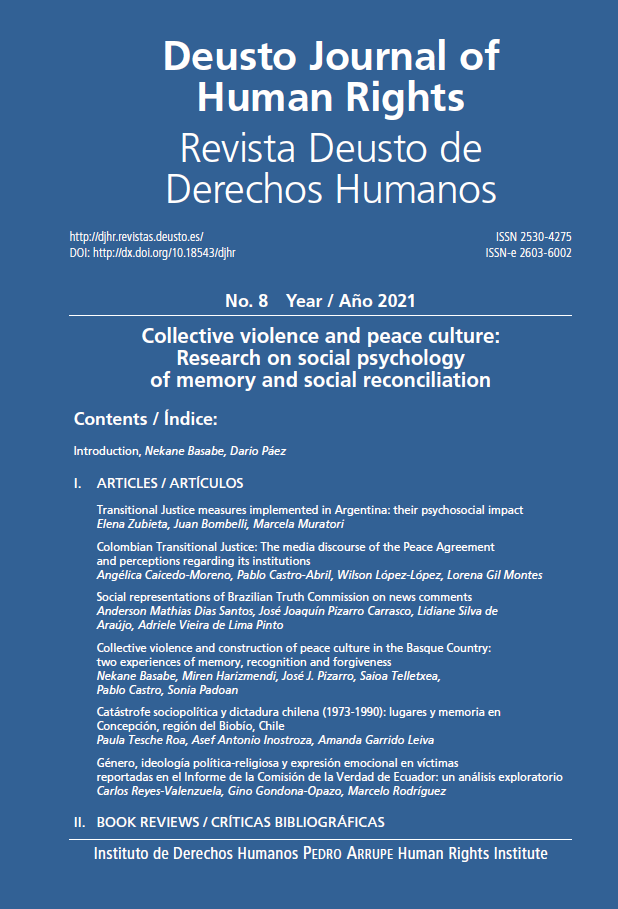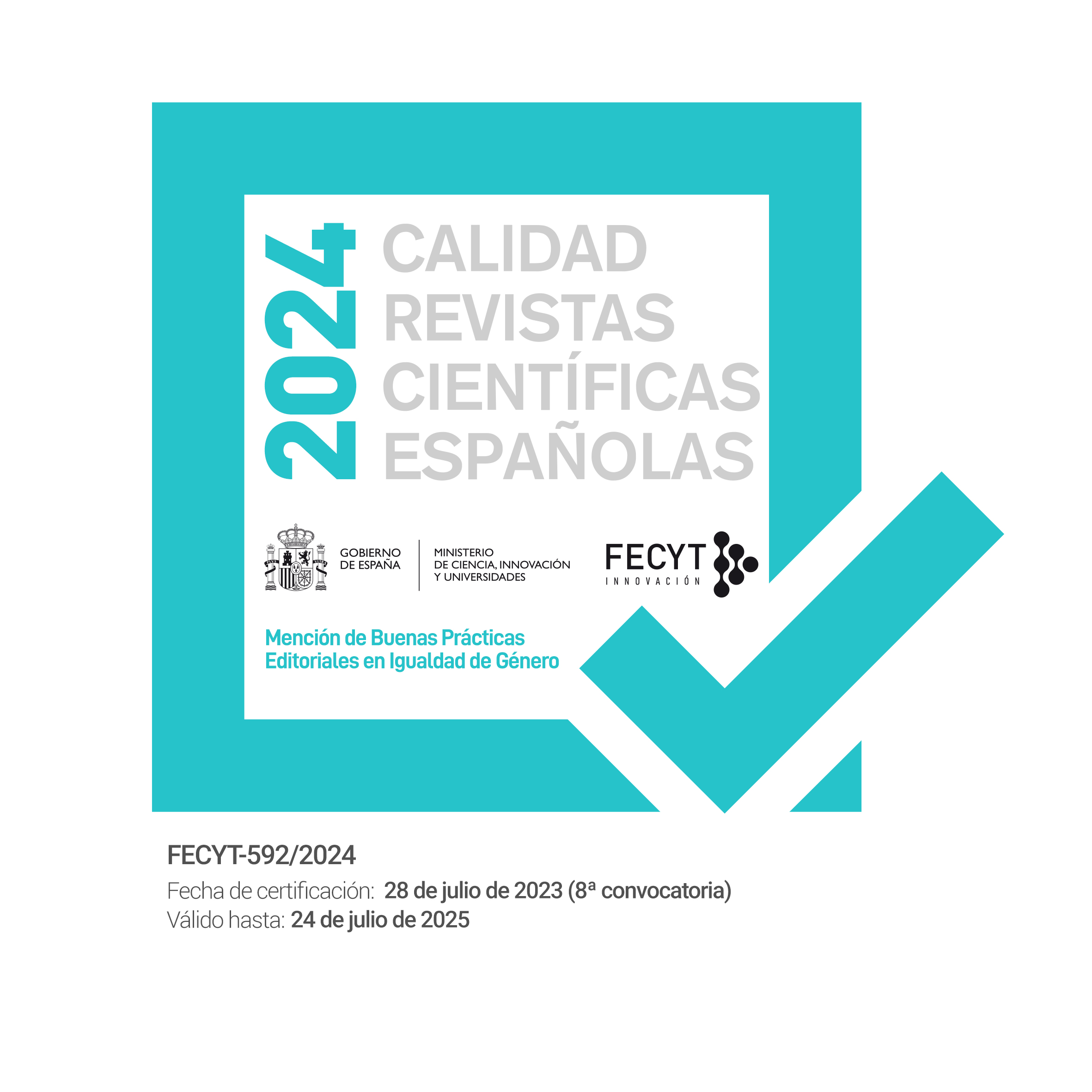Collective violence and construction of peace culture in the Basque Country: two experiences of memory, recognition and forgiveness
Abstract
Post-conflict societies must confront the past and build a culture of peace. Two interventions are presented here in the context of the Basque Country after the cessation of violence. The first, an intervention with the participation of victims of terrorism, where participants (N = 280 Mage = 19.83 SD = 1.29) were assigned to intervention and control groups. Results showed that participation in the programme produced more favourable attitudes towards intergroup forgiveness, intergroup empathy, and the mediating effect of self-transcending emotions. Second, the Citizenship Processes programme of memory and recognition (N = 31 Mage = 19.48 SD = 3.91). Results showed an increase in forgiveness, intergroup empathy and a change in outgroup emotions from before to after the intervention. The impact of both programmes was medium-high and the relevance of combining narratives that avoid competitive victimisation and promote peaceful intergroup attitudes is discussed.
Received: 14 September 2021
Accepted: 22 November 2021
Downloads
References
Bakeola. 2021. Procesos ciudadanos. Accessed September 10, 2021. http://www.bakeola.org/procesosciudadanos/index.html
Bobowik, Magdalena, M. Ángeles Bilbao, and Joana Momoitio. 2010. «Psychosocial effects of forgiveness petition and “self-criticism” by the Basque Government and Parliament directed to the victims of collective violence.» Journal of Social Psychology 25, no. 1: 87-100. https://doi.org/10.1174/021347410790193478.
Bobowik, Magadalena, Miren Harizmendi, Nekane Basabe, Saioa Telletxea, and José J. Pizarro. 2018. Bakeaz Blai: Social Sharing of the Victims’ Narrations Towards Reconciliation and Forgiveness Attitudes. Workshop on: «Sharing and Regulating Emotions in Legal Spaces: Mediation, Restoration, and Reconciliation.» Oñati: Oñati International Institute for the Sociology of Law: 31 May-1 June.
Bobowik, Magdalena, Darío Páez, James H. Liu, Laurent Licata, Olivier Klein, and Nekane Basabe. 2014. «Victorious justifications and criticism of defeated: Involvement of nations in World Wars, social development, cultural values, social representations of war, and willingness to fight.» International Journal of Intercultural Relations 43: 60-73. https://doi.org/10.1016/j.ijintrel.2014.08.013.
Bobowik, Magadalena, Dario Páez, Patrycja Slawuta, and Nekane Basabe. 2019. «How framing past political violence affects reconciliation through responsibility attributions and ingroup victimhood: the Basque case.» The International Journal of Restorative Justice 2, no. 2: 235-259. https://doi.org/10.5553/IJRJ/258908912019002002004.
Campos, Belinda, Michelle N. Shiota, Dacher Keltner, Gian C. Gonzaga and Jennifer L. Goetz. 2013. «What is shared, what is different? Core relational themes and expressive displays of eight positive emotions.» Cognition and Emotion 27, no. 1: 37-52. https://doi.org/10.1080/02699931.2012.683852.
Carmena, Manuela, Jon M. Landa, Ramón Múgica, y Juan Mª Uriarte. 2013. Informe-base de vulneraciones de derechos humanos en el caso vasco (1960-2013). Vitoria-Gasteiz: Secretaría general de paz y convivencia, Gobierno Vasco. Accessed September 10, 2021. https://www.euskadi.eus/documentos-paz-convivencia/web01-s1lehbak/es/.
Euskal Telebista. 2013. Glencree. Víctimas y memoria. Accessed September 10, 2021. https://www.eitb.tv/es/video/terror-de-estado-en-el-pais-vasco-terror-de-estado-en-el-pais-vasco/6249/49310/glencree
Fehr, Ryan, Michele J. Gelfand, and Monisha Nag. 2010. «The road to forgiveness: a meta-analytic synthesis of its situational and dispositional correlates.» Psychological bulletin 136, no. 5: 894-914. https://doi.org/10.1037/a0023012.
Fredrickson, Barbara L. 2009. Positivity. New York: Publisher Three Rivers Press.
Gibson, James L. 2004. Overcoming Apartheid: Can Truth Reconcile a Divided Nation? New York: Russell Sage Foundation.
Gobierno de España. 2011. Víctimas de ETA. Ministerio del Interior. Accessed June 1, 2021. http://www.mir.es/DGRIS/Terrorismo_de_ETA/ultimas_victimas/p12b-esp.htm.
Gobierno Vasco. 2021a. Víctimas: verdad, justicia y reparación. Accessed September 10, 2021. https://www.euskadi.eus/victimas-verdad-justicia-y-reparacion/web01-s1lehbak/es/
Gobierno Vasco. 2021b. Derechos Humanos, Convivencia y Cooperación. Accessed September 10, 2021. https://www.euskadi.eus/modulo-adi-adian/web01-s1lehbak/es/
Haidt, Jonathan 2003. «The moral emotions.» In Handbook of affective sciences, edited by Davidson, Richard J., Klaus R. Sherer, and H. Hill Goldsmith, 852-870, Oxford: Oxford University Press. Accesses September 10, 2021. https://www.overcominghateportal.org/uploads/5/4/1/5/5415260/the_moral_emotions.pdf
Hayes, Andrew F. 2013. Methodology in the social sciences. Introduction to mediation, moderation, and conditional process analysis: A regression- based approach. New York: Publisher Guilford Press.
Hoffman, Martin L. 1984. «Interaction of affect and cognition in empathy.» In Emotions, Cognition, and Behavior, edited by Carroll E. Izard, Jerome Kagan, and & Robert B. Zajonc, 103-131, New York: Cambridge University Press.
Krug, Etienne G, James A. Mercy, Linda L. Dahlberg, and Anthony B. Zwi. 2002. «The World report on violence and health.» The Lancet 360, October 5: 1083-1088. https://doi.org/10.1016/S0140-6736(02)11133-0.
Larizgoitia, Itziar, Itziar Fernández, Iñaki Markez, Isabel Izarzugaza, Arantza Larizgoitia, Florentino Moreno, Dario Páez, and Carlos Martin Beristain. 2011a. «Secuelas de la violencia colectiva: hablan las víctimas del estudio ISAVIC.» Gaceta Sanitaria 25, no 2: 115-121. https://doi.org/10.1016/j.gaceta.2010.11.005.
Larizgoitia, Itziar, Isabel Izarzugaza, Ioseba Iraurgi, Javier Ballesteros, Carlos G. Forero, Iñaki Márquez, and Jordi Alonso. 2011b. «Impacto de la violencia colectiva en la salud. Resultados del estudio ISAVIC en el País Vasco.» Gaceta sanitaria 25, no 2: 108-114. https://doi.org/10.1016/j.gaceta.2010.09.019.
Lastrego, Simona, and Laurent Licata. 2010. «Should a country’s leaders apologize for its past misdeeds?’ An analysis of the effects of both public apologies from a Belgian official and perception of Congolese victims’ continued suffering.» Journal of Social Psychology 25 no 1, 61-72. https://doi.org/10.1174/021347410790193432.
López López Wilson and Laura K. Taylor (eds.) 2021. Transitioning to Peace: Promoting Global Social Justice and Non-violence.Springer: Cham.
Martín Beristain, Carlos, and Darío Páez. 2000. Violencia, apoyo a las víctimas y reconstrucción social. Experiencias internacionales y el desafío vasco. Madrid: Fundamentos.
Martín-Beristain, Carlos, Dario Páez, Bernard Rimé, and Patric Kanyangara. 2010a. «Psychosocial effects of participation in rituals of transitional justice: A collective-level analysis and review of the literature of the effects of TRCs and trials on human rights violations in Latin America.» Journal of Social Psychology 25, no 1: 47-60. https://doi.org/10.1174/021347410790193450.
Martín-Beristain, Carlos, Dario Páez, Bernard Rimé, and Patrick Kanyangara. 2010b. «Efectos psicosociales de la participación en rituales de justicia transicional.» Revista de Psicología, 28, no 1: 9-35. https://doi.org/10.18800/psico.201001.001.
Mullet, Etienne, Maria da Conceição Pinto, Stéphanie Nann, Joachim Kadima Kadiangandu, and Félix Neto. 2011. «Hacia una política positiva: el caso del perdón en el contexto intergrupal en Asia y África.» In Superando la Violencia Colectiva y Construyendo Cultura de Paz, edited by Dario Páez, Carlos Martin-Beristain, José Luis González, Nekane Basabe, and Joseph de Rivera, 377-398, Madrid: Fundamentos.
Noor, Masi, Rupert Brown, Roberto Gonzalez, Jorge Manzi, and Christopher Alan Lewis. 2008. «On positive psychological outcomes: What helps groups with a history of conflict to forgive and reconcile with each other?.» Personality and Social Psychology Bulletin 34, no. 6: 819-32. https://doi.org/10.1177/0146167208315555.
Noor, Masi, Nurit Shnabel, Samer Halabi, and Bertjan Doosje. 2015. «Peace vision and its socio-emotional antecedents: The role of forgiveness, trust, and inclusive victim perceptions.» Group Processes & Intergroup Relations 18, no. 5: 644-54. https://doi.org/10.1177/1368430215586604.
Páez, Dario. 2010. «Official or political apologies and improvement of intergroup relations: A neo-Durkheimian approach to official apologies as rituals.» Journal of Social Psychology 25 no. 1: 101-115. https://doi.org/10.1174/021347410790193504.
Páez, Dario. & James H. Liu. 2012. «Collective Remembering». In The Encyclopedia of Peace Psychology, edited by D. J. Christie, 155-159, Oxford: Blackwell.
Páez, Darío, Carlos Martin-Beristain, José Luis González, Nekane Basabe, and Joseph de Rivera. 2011. Superando la Violencia Colectiva y Construyendo Cultura de Paz. Madrid: Fundamentos.
Pizarro, José J., Nekane Basabe, Alberto Amutio, Saioa Telletxea, Miren Harizmendi, and William Van Gordon. 1019. «The mediating role of shared flow and perceived emotional synchrony on compassion for others in a mindful-dancing program.» Mindfulness 11, no. 1: 125-39. https://doi.org/10.1007/s12671-019-01200-z.
Pizarro, José J., Nekane Basabe, Itziar Fernández, Pilar Carrera, Pedro Apodaca, Carlos I. Man Ging, Olaia Cusi and Darío Páez. 2021. «Self-Transcendent emotions and their social effects: Awe, elevation and kama muta promote a human identification and motivations to help others.» Frontiers in Psychology 12: 1-17. https://doi.org/10.3389/fpsyg.2021.709859.
Rimé, Bernard, Patrick Kanyangara, Vincent Yzerbyt, and Dario Paez. 2011. «The impact of Gacaca Tribunals in Rwanda: Psychosocial effects of participation in a truth and reconciliation process after a genocide.» European Journal of Social Psychology 41, no. 6: 695-706. https://doi.org/10.1002/ejsp.822.
Ruiz, Gorka, y Rocío Salazar. 2014. «Bakeaz Blai: Programa pedagógico con víctimas educadoras.» Oñati Socio-legal Series [online] 4 no. 3: 525-549. Accessed September 10, 2021. http://ssrn.com/abstract=2368140.
Salomon, Gavriel. 2004. «A narrative-based view of coexistence education.» Journal of Social Issues 60: 273-288. https://doi.org/10.1111/j.0022-4537.2004.00118.x.
Shnabel, Nurit, Samer Halabi, and Masi Noor. 2013. «Overcoming competitive victimhood and facilitating forgiveness through re-categorization into a common victim or perpetrator identity.» Journal of Experimental Social Psychology 49 no. 5: 867-877. https://doi.org/10.1016/j.jesp.2013.04.007.
Staub, Ervin. 2012. «Genocide, mass killing, and violent conflict: Prevention.» In The Oxford Handbook of Intergroup Conflict, edited by Linda R. Tropp, 273-290, Oxford: Oxford University Press. https://doi.org/10.1093/oxfordhb/9780199747672.013.0016.
Staub, Ervin, and Lorin A. Pearlman. 2001. «Healing, reconciliation, and forgiving after genocide and other collective violence.» In Forgiveness and reconciliation, edited by Raymond G. Helmick and Rodney L. Petersen, 195-217, Radnor, PA: Templeton Foundation Press.
Stellar, Jennifer E., Amie M. Gordon, Paul K. Piff, Daniel Cordaro, Craig L. Anderson, Yang Bai, Laura A. Maruskin, and Dacher Keltner. 2017. «Self- transcendent emotions and their social functions: Compassion, gratitude, and awe bind us to others through prosociality.» Emotion Review 9, no. 3: 200-207. https://doi.org/10.1177/1754073916684557.
Tam, Tania, Miles Hewstone, Ed Cairns, Nicole Tausch, Greg Maio, and Jared Kenworthy. 2007. «The impact of intergroup emotions on forgiveness in Northern Ireland.» Group Processes & Intergroup Relations 10, no. 1: 119-36. https://doi.org/10.1177/1368430207071345.
Van Cappellen, Patty, and Bernard Rimé. 2014. «Positive emotions and self- transcendence.» In Religion, personality, and social behaviour, edited by Vassilis Saroglou, 123-145. New York: Psychology Press. https://doi.org/10.4324/9780203125359.
Van Tongeren, Daryl R., Jeni L. Burnette, Ernest O’Boyle, Everett L. Worthington, and Donelson R. Forsyth. 2014. «A meta-analysis of intergroup forgiveness.» The Journal of Positive Psychology 9, no. 1: 81-95. https://doi.org/10.1080/17439760.2013.844268.
Wohl, Michael J., Matthew J. Hornsey, and Shannon H. Bennett. 2012. «Why group apologies succeed and fail: Intergroup forgiveness and the role of primary and secondary emotions.» Journal of Personality and Social Psychology 102, no. 2: 306-22. https://doi.org/10.1037/a0024838.
Wohl, Michael J., and Nyla R. Branscombe. 2005. «Forgiveness and collective guilt assignment to historical perpetrator groups depend on level of social category inclusiveness.» Journal of Personality and Social Psychology 88, no. 2: 288-303. https://doi.org/10.1037/0022-3514.88.2.288.
Vollhardt, Johanna Ray. 2015. «Inclusive victim consciousness in advocacy, social movements, and intergroup relations: promises and pitfalls.» Social Issues and Policy Review 9, no. 1: 89-120. https://doi.org/10.1111/sipr.12011.
Zumeta, Larraitz, Nekane Basabe, Anna Wlodarczyk, Magdalena Bobowik, and Dario Páez, D. 2016. «Shared flow and positive collective gatherings.» Annals of Psychology 32, no. 3: 717-727. http://dx.doi.org/10.6018/analesps.32.3.261651.
Deusto Journal of Human Rights / Revista Deusto de Derechos Humanos is an Open Access journal; which means that it is free for full and immediate access, reading, search, download, distribution, and reuse in any medium only for non-commercial purposes and in accordance with any applicable copyright legislation, without prior permission from the copyright holder (University of Deusto) or the author; provided the original work and publication source are properly cited (Issue number, year, pages and DOI if applicable) and any changes to the original are clearly indicated. Any other use of its content in any medium or format, now known or developed in the future, requires prior written permission of the copyright holder.



3.jpg)
3.jpg)
3.jpg)
.jpg)








